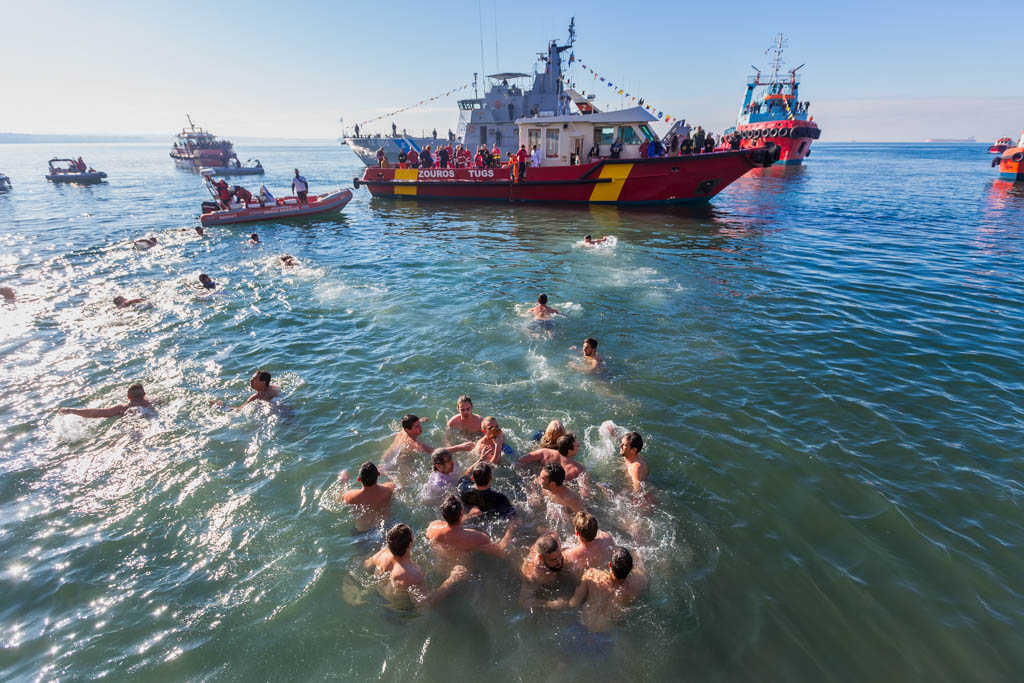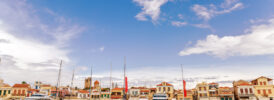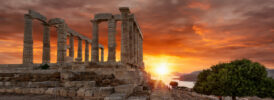The Holiday season in Greece does not wrap up on January 1st – there is still more to celebrate here in this devout and festive country. In Greece, the holiday season comes to a finale a few days into the new year. On the 6th of January, all Greece celebrates Epiphany. This is the 12th day of Christmas, as in the song “The Twelve Days of Christmas”.
Epiphany is the day celebrating the baptism of Christ by John the Baptist. The Holy Trinity comes together in this holiday: God the Father spoke from the heavens, God the Son was being baptized, and the Holy Spirit appeared, represented by a dove.
A Baptism of the Waters
On Epiphany, all the waters are blessed in a very festive, and even exciting, ceremony. Of course there is so much sea in Greece – that amazing coastline and all of those islands. But the land is also rich with rivers and lakes. All bodies of water will be blessed today, as from each parish a few brave young men will get ready to retrieve the cross. The priest throws a cross into the water and they swim after it. The next moment, the priest also releases a dove into the air – the Holy Spirit. It is a moment of great joy for all – one truly feels a holy presence everywhere.

Afterwards, everyone goes back to the church to receive a blessing – a bash of fragrant basil on the forehead, damp with holy water. Then everyone collects some holy water outside the church and brings it home – everyone has some of the water, also the animals.
A Festival of Light

In Greece, the holiday is also called “Theophaneia” – the day the light of God shines through. Actually, it’s also just called “Ta Fota” – “The Lights.” And indeed somehow, the weather is often unusually clear and bright for Epiphany in Greece. In fact Epiphany usually corresponds with a special time – the “Alkyonides Meres” or as many of us know them, “Halcyon Days.”
The Alkionides Meres in Greece
In the heart of winter, there is often reprieve from the cold – a period of surprisingly warm, sunny and calm days. These are called the “Alkionides Meres” – the “Halcyon Days,” and they are rooted in a myth.
Alcyone, the daughter of Aeolus, the god of the winds. Alcyone was married to Ceyx, king of Thessaly, and they were very happy and beloved by all. All except a jealous Zeus, that is. Ceyx drowned, and Alcyone was determined to follow him to the underworld. But the gods intervened, and turned the lovers into a pair of birds – “alkyonides” in Greek, kingfisher in English. These birds had the power to calm the winter seas.
 Why do we have such a positive association with this bird? The kingfisher lays its eggs in winter, and it needs some warm and calm days to do so. So we associate these pleasant days with the birds. Of course, seafarers also like the calm seas they bring, therefore the happy association with “Halcyon Days” – it has come to mean a lovely and idyllic time, very much like the holiday season with which it coincides.
Why do we have such a positive association with this bird? The kingfisher lays its eggs in winter, and it needs some warm and calm days to do so. So we associate these pleasant days with the birds. Of course, seafarers also like the calm seas they bring, therefore the happy association with “Halcyon Days” – it has come to mean a lovely and idyllic time, very much like the holiday season with which it coincides.
Winter in Greece
Many lovely things come together in the Greek winter. The Holiday season comes to a festive and spiritually cleansing finale with Epiphany. And of course there are the name day celebrations. All names related to light and divine joy are celebrated – Fotis and Foteini, Theocharis, Theofanis, Ourania, and more. And the next day, January 7th, is Yiannis and Yianna – “John and Joanna.” Nearly every Greek family will have at least one family member to celebrate on the 6th or the 7th.
 Additionally, the Alkionides Meres are cause for celebration in themselves. Who can resist enjoying an afternoon lunch of ouzo and meze in the bright sunshine? Sometimes one needs only a light sweater and of course a pair of sunglasses for a festive meal by the seaside. Skiing, too, can be lovely on the Halcyon days, as the snowy slopes glitter in the sunshine. And for those who prefer more urban pleasures, the cities are at their shining best (and of course far less crowded with visitors). The cultural season is in full swing, with exciting offerings at museums, galleries, and plenty of offerings in music, dance, and theater.
Additionally, the Alkionides Meres are cause for celebration in themselves. Who can resist enjoying an afternoon lunch of ouzo and meze in the bright sunshine? Sometimes one needs only a light sweater and of course a pair of sunglasses for a festive meal by the seaside. Skiing, too, can be lovely on the Halcyon days, as the snowy slopes glitter in the sunshine. And for those who prefer more urban pleasures, the cities are at their shining best (and of course far less crowded with visitors). The cultural season is in full swing, with exciting offerings at museums, galleries, and plenty of offerings in music, dance, and theater.
Have you ever visited Greece in January? It can be a lovely time to really experience local culture and enjoy gentler weather.





